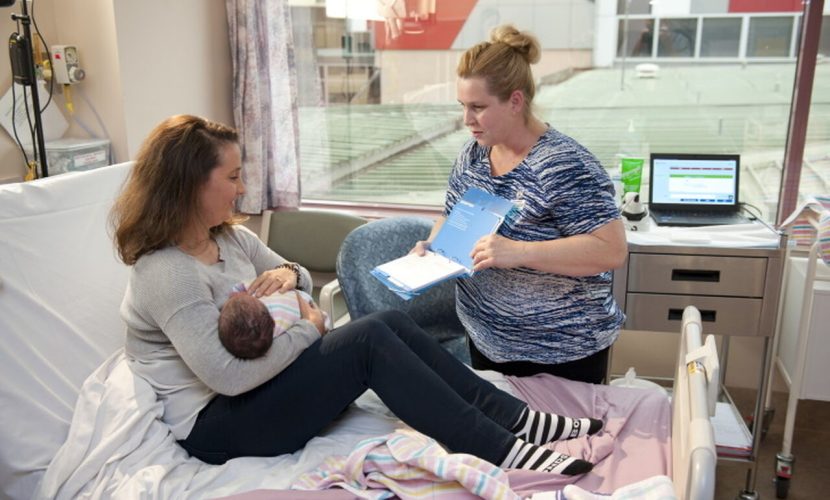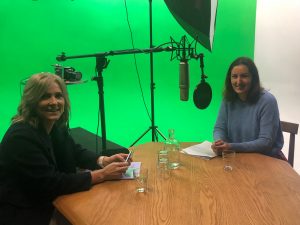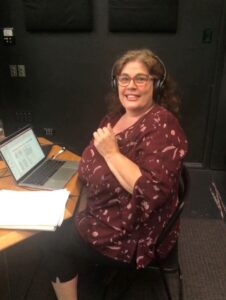Obstetric Shared Care
Pre-Term Birth Prevention
iSISTAQUIT
iSISTAQUIT is a wrap-around support for pregnant Aboriginal and Torres Strait Islander women who are wanting to quit smoking/vaping.
It involves a model of care designed with culturally appropriate and national best practice training informed from previous studies. iSISTAQUIT provides vital training for health professionals and encouragement to communities and pregnant women to quit smoking/vaping.
Having culturally thought out approaches with assisting women to quit smoking/vaping through a pathway of support, helps Indigenous women navigate health and wellbeing systems safely.
CaFHS
All Things CaFHS – Bringing it all together
- Host: Leanne March | GP Obstetric Shared Care Program Manager
- Guest Speakers: Dr Jenni Goold and Dr Liberty Gallus

Website: https://www.cafhs.sa.gov.au/
The Child and Family Health Service (CaFHS) supports families in South Australia with children aged 0–5 years by responding early in life to children’s health, development, and wellbeing needs. The child is at the centre of all decision making and intensive support is offered to those with greater need.
CaFHS work with families for the best health and development outcomes for children, and staff will refer families to other healthcare and community services as required.
- Child health, development and emotional wellbeing
- Relationships
- Caregiver wellbeing and parenting
Dr Jenni Goold
Jenni is a Specialist GP who has a very special interest in antenatal care and is passionate about GP Obstetric Shared Care.
She has worked for over a decade in the Obstetrics Antenatal Outpatients Departments at the QEH, LMcHS & WCH as a Visiting Medical Officer. In addition, Jenni consults at Firle Medical Centre. She is a Lactation Consultant; she holds a Diploma in Obstetrics and Gynaecology and a Diploma in Clinical Education. She is a Medical Educator for the RACGP Training Program. Education being another of her passions.
Jenni is a Lead GP Advisor to GP Partners Australia.
More recently, Jenni has been the Senior Clinical Lead for COVID-19 GP Assessment Services Team, and she is now the current Medical Director with the Calvary/Medibank joint venture, My Home Hospital.
Dr Liberty Gallus
Liberty is a general and community paediatrician who has held a non-clinical position with the Child and Family Health Service (CaFHS) since 2021.
Part this role is assisting with strengthening the links and pathways between CaFHS and other health providers to improve care for young children and their families in South Australia.
Liberty has been a staff specialist at the Southern Adelaide Local Health Network since 2004 and works with the Children’s Assessment Team and the Child Protection Service. Her clinical work includes the assessment of children with complex developmental needs, undertaking forensic medical examinations in children in whom abuse is suspected, and seeing children in the Out of Home Care clinic.
Talking COVID 2022 in Pregnancy –
GP Obstetric Shared care Q&A
Perinatal Principles
Provide safe care for COVID-19 positive women and their babies.
- All health care providers to promote and facilitate vaccinations for pregnant women across the state.
- COVID-19 positive pregnant women will birth at Flinders Medical Centre (FMC), the SA Health designated COVID hospital for pregnancy, birth, and neonatal care.
- COVID-19 positive Maternal-Fetal Medicine (MFM) women to be cared for by Women’s and Children’s Network (WCHN) with conference in relation to birthing hospital.
- Cardiac babies to deliver at WCHN.
- Clinical risk of transfer to FMC is to be balanced against providing immediate care to the pregnant woman.
- All LHNs to be prepared to support COVID-19 positive pregnant women and neonates.
- Not all LHNs have the appropriate infrastructure or staffing skill mix to safely support COVID-19 births.
- However, COVID-19 positive pregnant women who attend other LHNs in established labour are to remain at the presenting hospital. (Refer to the local LHN COVID-19 Management Plan.)
- Community Primary Care Providers, CRCT and GPAT Doctors are to work with LHNs for the care of their patients.
- Suspected COVID-19 (sCOVID) patients and positive patients who don’t require face to face care are to be managed with local systems and flows.
- Decanting across sites (including private hospitals) inclusive of elective c-section and gynaecology lists for non-COVID-19 women to be done in private and will be negotiated.
There will be visibility of COVID-19 positive pregnant women requiring tertiary care via agreed mechanisms, for example Daily Huddle for state bed management and CRCT Dashboard
Useful Links
Presentations Slides
POPPIE Study
- The PoppiE Study has been funded by the Australian Government and is designed to see if reducing the amount of iodine in prenatal supplements taken by women who get enough iodine in their diet, will improve the developmental scores of their children.
- Getting the right amount of iodine during pregnancy is important as it helps with baby’s growth and brain development.
- Iodine is added to our food supply and women are also advised to take a prenatal supplement that contains iodine throughout their pregnancy.
- Recent studies suggest that some women get enough iodine from the food they eat and may not need the amount of iodine that is contained in common prenatal supplements.
- The PoppiE study will enrol 754 women who are less than 13 weeks of pregnancy from around Australia.
- SAHMRI Women and Kids will then assess the development of these babies at 24 months of age.
What is GPEx’s involvement?
- GPEx recognises the importance of research to support evidence-based advice for pregnant women and the crucial role that GPs can play in facilitating contact between SAHMRI and pregnant women.
- GPEx will manage GP participation in the recruitment of pregnant women and will implement strategies to reduce the demand on GPs.
- GPEx will assist GPs with the on-boarding process and will facilitate GP reimbursement when eligible women are referred to the PoppiE Study.
Download EOI Form Please complete and return to leanne.march@gpex.com.au
Covid Update for SA GPs (recorded 7th Feb 2022)
Reducing the Risk of Early Preterm Birth: OMEGA-3 Status Test Screening and Targeted Advice
- Host: Ms Leanne March | GP Obstetric Shared Care Program Manager
- Guest Speaker: Dr Karen Best and Dr Rhiannon Smith

Dr Karen Best
Karen Best is a Senior Post Doctoral Research Fellow at the South Australian Health and Medical Research Institute (SAHMRI), Women and Kids Theme, based at the Women’s and Children’s Hospital in Adelaide.
Formerly a midwife, Karen has worked in clinical research for the past 15 years and is committed to improving the nutrition and health of mothers and their babies through the conduct and translation of high quality clinical trials.
Karen’s work focuses on nutritional interventions during pregnancy, and she has managed research projects involving more than 11,000 participants enabling publications in the prestigious journals the New England Journal of Medicine, the Journal of the American Medical Association and the British Medical Journal.
Dr Rhiannon Smith
Dr Rhiannon Smith is a GP Obstetrician and Lactation Consultant and participates in the SA GP Obstetric Shared Care Program.
Rhiannon has a passion for providing quality obstetric and postnatal care for families. She thoroughly enjoys getting to know families and supporting them through a special time in their lives.
She underwent further training in Neurodevelopmental Care of the Infant through the Possums Clinic in Queensland.
She is the co-founder of Adelaide Mums and Babies Clinic, which provides pregnancy and postnatal support in four sites across Adelaide.
Rhiannon has been involved in this exciting research project, looking at Omega-3 status test screening and targeted advice, which is a joint investigation between SAHMRI and SA Pathology. GPs are an integral part of this research.
About the Podcast
SA Pathology and the South Australian Health and Medical Research Institute (SAHMRI) are partnering to offer omega-3 testing for women with singleton pregnancies, as part of the South Australian Maternal Serum Antenatal Screening (SAMSAS) program. This will identify women who will benefit from omega-3 supplementation and appropriate advice to reduce their risk of early birth.
GP Partners Australia are enthusiastic to bring this to participants of the GP Obstetric Shared Care Program.
Of note;
- Women with low omega-3 status are at higher risk of prematurity and supplementing
these women reduces their risk of EPTB - Women with higher omega-3 status do not need extra omega-3 supplementation, and
extra supplementation may increase their risk of early preterm birth - Updated recommendations for omega-3 in pregnancy
New Omega-3 test for all pregnant women in South Australia – personalised advice based on omega-3 status
Important | Omega-3 status testing – Updated Guidelines
Based on feedback provided by health professionals during in-services and seminars, and backed by the latest evidence, SAHMRI have updated their pregnancy care guidance for women with sufficient omega-3 status.
The new guidance recognises that some women with sufficient status wish to take prenatal vitamin and mineral supplements that contain low doses of omega-3 fatty acids, although they are not needed to reduce prematurity risk.
This new guidance will be reflected in test results issued from 17 November. The findings from a recent randomised controlled trial and the update of the Cochrane review provide evidence to support that not exceeding 250 mg omega-3 DHA+EPA per day will be safe and will have no effect on prematurity or other pregnancy outcomes.
Letter from Dr Tom Dodd, Clinical Service Director, SA Pathology
Useful Links
- South Australian Perinatal Practice Guideline GP Obstetric Shared Care July 2024
- SAHMRI Request Form
- Reducing the risk of early preterm birth: Omega-3 status test screening and targeted advice: Presented by: Professor Maria Makrides, Theme Leader SAHMRI Women and Kids – South Australian Health & Medical Research Institute on behalf of the Omega-3 Implementation Group
- Omega-3 status test for prematurity risk – Information for health professionals SA Maternal Serum Antenatal Screening (SAMSAS) Program
- Omega-3 screening to help prevent premature births – Information for families
- Supplement advice based on omega-3 test results
- Common Pregnancy Supplement Advice
- https://www.sahmri.org/omega
To order the maternal serum screening test request forms, please call the SAMSAS Program on (08) 8161 7285 or download the request form via this link.
The Passionate Pursuit of GP Obstetric Shared Care
- Host: Dr Russell Shute – GP Advisor | GPPA
- Guest Speaker: Dr Jenni Goold – GP Advisor | GP OSC Program
- Dr Jenni Goold – MBBS, FRACGP

Jenni is a GP who has a very special interest in antenatal care.
She has worked for over a decade in the Obstetrics Antenatal Outpatients Departments at the QEH, LMcHS & WCH as a Visiting Medical Officer.
Jenni was involved in the initial establishment of the SA GP Obstetric Shared Care Program many years ago, and her interest has continued to the Statewide Program as we now know it today. She is passionate about Obstetric Shared Care and the fantastic program that it provides for women, families, and GPs.
In addition, Jenni consults at Firle Medical Centre. She is a Lactation Consultant, she holds a Diploma in Obstetrics and Gynaecology and a Diploma in Clinical Education. Education being another of her passions.
Jenni is the Lead GP Advisor to the SA GP OSC Program managed by GP Partners Australia and she participates in supervised clinical attachments at the Women’s and Children’s Hospital to assist our GPs with their accreditation requirements.
More recently, Jenni has been the Senior Clinical Lead for COVID-19 GP Assessment Services Team, and they are to continuing to provide an amazing service.
She has four children and is absolutely amazing how she juggles her time and keeps her sanity!
Useful Links
Thalassaemia/Heamoglobinthy Antenatal Screening
- Host: Dr Russell Shute – GP Advisor to the SA Palliative Shared Care Program
- Guest Speaker: Dr David Ross
- DR DAVID ROSS – MBBS, PhD, FRACP, FRCPA – Consultant Haematologist
Dr David Ross trained in clinical and laboratory haematology at the Royal Adelaide Hospital and the IMVS, spending one year at Addenbrooke’s Hospital in Cambridge.
In 2009, he was awarded a PhD for his thesis on the subject of minimal residual disease in chronic myeloid leukaemia.
In 2009, he joined the Haematology Department at Flinders Medical Centre, where he is responsible for diagnostic haematology services.
He is also an investigator in several clinical trials, and an active member of the Australasian Leukaemia and Lymphoma Group.
His involvement in thalassaemia stems from his interest in molecular diagnostics in haematology.
Thalassaemia is an inherited disorder associated with impaired synthesis of one or more globin chains with alpha thalassaemia and beta thalassaemia being the most common forms.
Haemoglobinopathies are a group of inherited disorders characterised by structural variations of the haemoglobin molecule, such as HbS (sickle), HbE etc
All women at their first antenatal visit are encouraged to complete the ‘Family of Origin Questionnaire’ – Thalassaemia / Haemoglobinopathy (Ref. Statewide Anaemia Guideline).
If the woman has not had a recent CBE and iron studies performed at SA PATHOLOGY samples to perform these tests should be collected and forwarded with the questionnaire and a copy of any available pathology results.
It is important to link information with both partners being tested and to identify at risk couples.
Useful Links
Pre-Conception Genetic Screening
- Host: Dr Annie Lin
- Guest Speaker: Associate Professor Christopher Barnett
Associate Professor Chirstopher Barnett – MBBS, FRACP, FCCMG – Clinical Geneticist, (HGSA)
A/Prof Chris Barnett has dual fellowships in neonatal/perinatal medicine and clinical genetics and is the head of the Paediatric and Reproductive Genetics Unit at the Women’s and Children’s Hospital in Adelaide.
He is the clinical lead of the NHMRC funded Genomic Autopsy Project and on the expert advisory committee of the Genomics Health Futures Mission, the Australian government’s $500 million research investment in the future of genomic medicine in Australia.
A/Prof Barnett’s neonatal training was done in Adelaide at the University of Adelaide and Women’s and Children’s Hospital and in Toronto, Canada at the University of Toronto and The Hospital for Sick Children. He was a consultant neonatologist at the Women’s and Children’s Hospital from 1997-2002 and then in private neonatal/paediatric practice from 2002-2007. A/Prof Barnett is a past president of the SA branch of the Perinatal Society of Australia and New Zealand (PSANZ). A/Prof Barnett’s clinical genetics training was undertaken at University of Toronto and The Hospital for Sick Children, Toronto and at the Women’s and Children’s Hospital in Adelaide.
He has research interests in prenatal genetics, fetal pathology and rare childhood diseases and has over 80 publications in peer-reviewed journals and has written multiple book chapters.